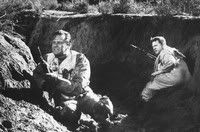


1482129 Curiosities served
The Bridges at Toko-Ri
Previous Entry :: Next Entry
Read/Post Comments (10)
I said I remember the movie but all I actually recalled through the years was the ending because it shocked my childish expectations. The rest was less than hazy. I had the idea the story was set during WW II whereas the risky mission to destroy four vital bridges actually took place during the Korean conflict. William Holden, Grace Kelly and Fredrick March were just anonymous actors to me. Mickey Rooney I recognized.

Recently I read the James Michener book upon which the movie was based. I wasn't familiar with Michener's writing. He had become fixed in a my teenage mind as an author of bestsellers. The sort of thing I did not deign to read. Then too, he wrote massive epics, while I have remained partial to short novels, even though my taste has expanded in other ways. The massive monolith Hawaii weighed down the living room coffee table for weeks. My father, who had spent his service time in Hawaii loved the book.
The Bridges at Toko-Ri is very short, a novella length actually, but packed with enough incident and character for a far longer work. It begins with the breathtaking helicopter rescue of a downed pilot in the icy waters off Korea which might have served as a climactic scene for some novels. There are aircraft carrier landings on storm tossed decks, pilots braving heavy anti-aircraft fire during bombing runs and struggling home low on fuel, barroom brawls.
All depicted in a concise and unadorned style. The drama is entirely in what is described rather than the words themselves. I like that sort of writing even if I am not always able to stick to it myself.
I was also impressed by how memorable many of the characters become in such a short space. Ace pilot Harry Brubaker resents having been yanked out of his civilian career to fly missions over Korea, and what's more, he is scared. Admiral Tarrant spouts the obligatory patriotic lines about the need to preserve the American way of life, but war has already destroyed his family and its clear even to the warriors that no one back home cares about the Korean fight.
Interestingly several of the major characters are not fighters per se. Top notch rescue pilot Mike Forney wears a bright green top hat and scarf (Who says writers shouldn't use "funny hats"?) so downed fliers can see him coming and know they'll soon be plucked out of danger. Then there's Beer Barrel, the enormous landing-signal officer with a preternatural talent for guiding pilots to safe landings. The pilots have a practically religious faith in his ability ability to bring them down safely. I have no idea what Michener's political views were, or what his opinion of the Korean war was. I wouldn't say he glorified the men who fought, and I can't imagine anyone would see the novel as a glorification of that war, or any war. The story he tells is grim. The ending still left me stunned, even though I remembered it from the movie for more than half a century.

Read/Post Comments (10)
Previous Entry :: Next Entry
Back to Top

